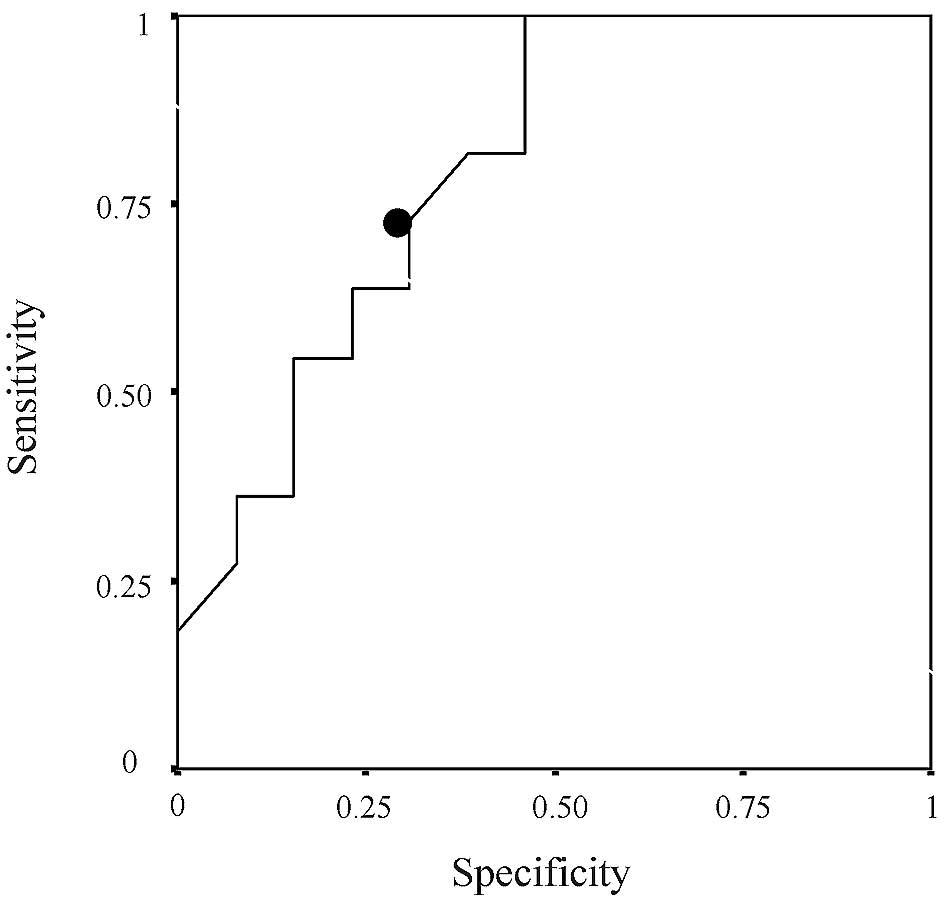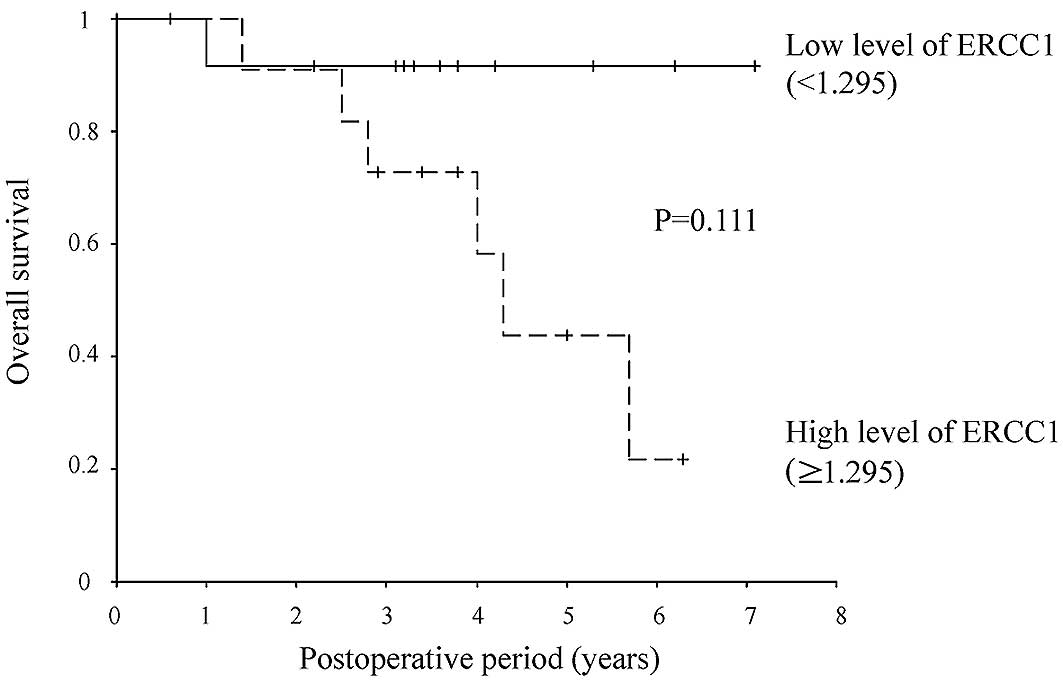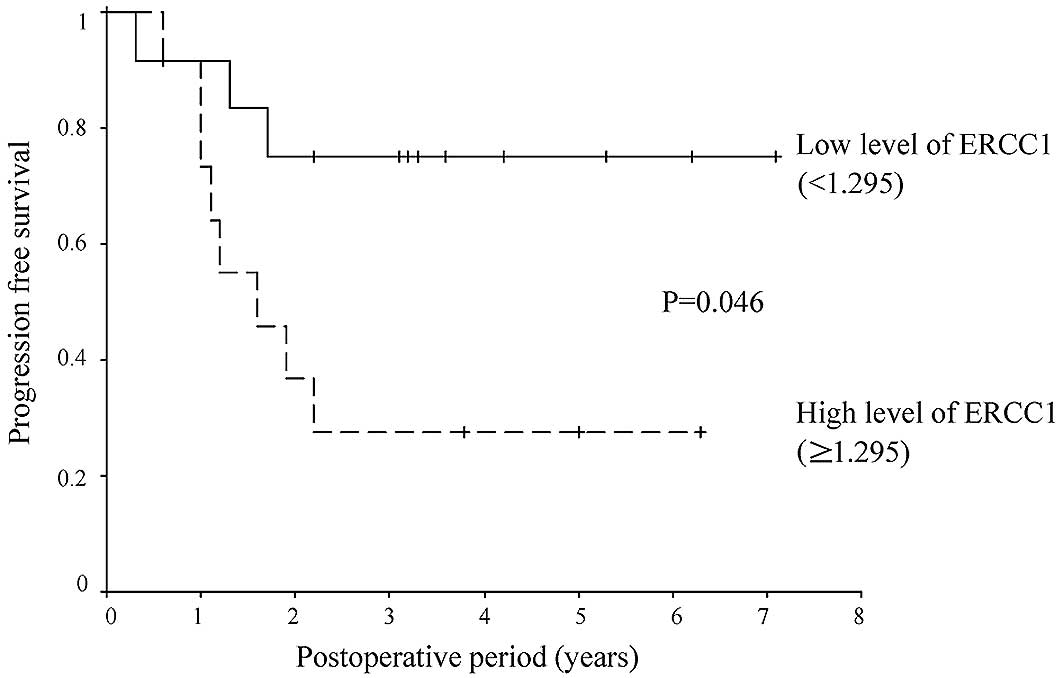|
1.
|
Matsuda T, Marugame T, Kamo K, Katanoda K,
Ajiki W and Sobue T; The Japan Cancer Surveillance Research Group:
Cancer incidence and incidence rates in Japan in 2002: based on
data from 11 population-based cancer registries. Jpn J Clin Oncol.
38:641–648. 2008. View Article : Google Scholar : PubMed/NCBI
|
|
2.
|
Parkin DM, Whelan SL, Ferlay J, Teppo L
and Thomas DB: Cancer incidence in five continents. IARC Scientific
Publications no. 155. Vol. 8, Lyon,. 2002
|
|
3.
|
WHO databank: http://www.depdb.iarc.fr/who/menu.htmluri.
|
|
4.
|
Duschinsky R, Pleven E and Heidelberger C:
The synthesis of 5-fluoropyrimidines. J Am Chem Soc. 79:45591957.
View Article : Google Scholar
|
|
5.
|
Heidelberger C, Chaudhuri NK, Danneberg P,
Mooren D, Griesbach L, Duschinsky R, Schnitzer RJ, Pleven E and
Scheiner J: Fluorinated pyrimidines, a new class of
tumour-inhibitory compounds. Nature. 179:663–666. 1957. View Article : Google Scholar : PubMed/NCBI
|
|
6.
|
MacDonald JS, Schin P, Woolley PV, Smythe
T, Ueno W, Hoth D, Smith F, Boiron M, Gisselbrecht C, Brunet R and
Lagarde C: 5-Fluorouracil, doxorubicin and mitomycin (FAM)
combination chemotherapy for advanced gastric cancer. Ann Intern
Med. 93:533–536. 1980. View Article : Google Scholar : PubMed/NCBI
|
|
7.
|
Scheithauer W, Rosen H, Kornek GV, Sebesta
C and Depisch D: Randomised comparison of combination chemotherapy
plus supportive care with supportive care alone in patients with
metastatic colorectal cancer. BMJ. 306:752–755. 1993. View Article : Google Scholar : PubMed/NCBI
|
|
8.
|
Colorectal Cancer Collaborative Group:
Palliative chemotherapy for advanced colorectal cancer: systematic
review and metaanalysis. BMJ. 321:531–535. 2000. View Article : Google Scholar : PubMed/NCBI
|
|
9.
|
Meyerhardt JA and Mayer RJ: Systemic
therapy for colorectal cancer. N Engl J Med. 352:476–487. 2005.
View Article : Google Scholar : PubMed/NCBI
|
|
10.
|
Leichman CG, Lenz H-J, Leichman L,
Danenberg K, Baranda J, Groshen S, Boswell W, Metzger R, Tan M and
Danenberg PV: Quantitation of intratumoral thymidylate synthase
expression predicts for disseminated colorectal cancer response and
resistance to protracted-infusion fluorouracil and weekly
leucovorin. J Clin Oncol. 15:3223–3229. 1997.
|
|
11.
|
Lenz H-J, Hayashi K, Salonga D, Danenberg
KD, Danenerg PV, Metzger R, Banerjee D, Bertino JR, Groshen S,
Leichman LP and Leichman CG: p53 point mutations and thymidylate
synthase messenger RNA levels in disseminated colorectal cancer: an
analysis of response and survival. Clin Cancer Res. 4:1243–1250.
1998.PubMed/NCBI
|
|
12.
|
Cascinu S, Ashele C, Barni S, Debernardis
D, Baldo C, Tunesi G, Catalano V, Staccioli MP, Brenna A, Muretto P
and Catalano G: Thymidylate synthase protein expression in advanced
colon cancer: correlation with the site of metastasis and the
clinical response to leucovorin-modulated bolus 5-fluorouracil.
Clin Cancer Res. 5:1996–1999. 1999.
|
|
13.
|
Bathe OF, Franceschi D, Livingstone AS,
Moffat FL, Tian E and Ardalan B: Increased thymidylate synthase
gene expression in liver metastases from colorectal carcinoma:
implications for chemotherapeutic options and survival. Cancer J
Sci Am. 5:34–40. 1999.PubMed/NCBI
|
|
14.
|
Paradiso A, Simone G, Petroni S, Leone B,
Vallejo C, Lacava J, Romero A, Machiavelli M, Lena MD, Allegra CJ
and Johnson PG: Thymidylate synthase and p53 primary tumor
expression as predictive factors for advanced colorectal cancers.
Br J Cancer. 82:560–567. 2000. View Article : Google Scholar : PubMed/NCBI
|
|
15.
|
Johnson PG, Fisher ER, Rockette HE, Fisher
B, Wolmark N, Drake JC, Chabner BA and Allegra CJ: The role of
thymidilate synthase expression in prognosis and outcome of
adjuvant chemotherapy in patients with rectal cancer. J Clin Oncol.
12:2640–2647. 1994.PubMed/NCBI
|
|
16.
|
Takenoue T, Nagawa H, Matsuda K, Fujii S,
Nita ME, Hatano K, Kitayama J, Tsuruo T and Muto T: Relation
between thymidilate synthase expression and survival in colon
carcinoma, and determination of appropriate application of
5-fluorouracil by immunohistochemical method. Ann Surg Oncol.
7:193–198. 2000. View Article : Google Scholar
|
|
17.
|
Elder D, Glimelius B, Hallstrom M,
Jakobsen A, Johnson PG, Magnusson I, Ragnhammar P and Blomgren H:
Thymidilate synthase expression in colorectal cancer: a prognostic
and predictive marker of benefit from adjuvant fluorouracil-based
chemotherapy. J Clin Oncol. 20:1721–1728. 2002. View Article : Google Scholar
|
|
18.
|
Findlay MPN, Cunningham D, Morgan G,
Clinton S, Hardcastle A and Aherne GW: Lack of correlation between
thymidylate synthase levels in primary colorectal tumors and
subsequent response to chemotherapy. Br J Cancer. 75:903–909. 1997.
View Article : Google Scholar : PubMed/NCBI
|
|
19.
|
Ashele C, Debernardis D, Tunesi G, Maley F
and Sobrero A: Thymidilate synthase protein expression in primary
colorectal cancer compared with the corresponding distant
metastases and relationship with the clinical response to
5-fluorouracil. Clin Cancer Res. 6:4797–4802. 2000.
|
|
20.
|
Etienne MC, Cheradama S, Fischel JL,
Formento P, Dassonville O, Renee N, Schneider M, Thyss A, Demard F
and Milano G: Response to flurouracil therapy in cancer patients:
the role of tumoral dihydropyrimidine dehydrogenase activity. J
Clin Oncol. 13:1663–1670. 1995.PubMed/NCBI
|
|
21.
|
Salonga D, Danenberg KD, Johnson M,
Metzger R, Groshen S, Tsao-Wei DD, Lenz HJ, Leichman CG, Leichman
L, Diasio RB and Danenberg PV: Colorectal tumors responding to
5-fluorouracil have low gene expression levels of dihydropyrimidine
dehydrogenase, thymidilate synthase and thymidine phosphorylase.
Clin Cancer Res. 6:1322–1327. 2000.
|
|
22.
|
Fukui Y, Oka T, Nagayama S, Danenberg PV,
Danenberg KD and Fukushima M: Thymidilate synthase,
dihydropyrimidine dehydrogenase, orotate phosphoribosyltransferase
mRNA and protein expression levels in solid tumors in a large scale
population analysis. Int J Mol Med. 22:709–716. 2008.
|
|
23.
|
Houtsmuller AB, Rademakers S, Nigg AL,
Hoogstraten D, Hoeijmakers JHJ and Vermeulen W: Action of DNA
repair endonuclease ERCC1/XRF in living cells. Science.
284:958–961. 1999. View Article : Google Scholar : PubMed/NCBI
|
|
24.
|
Altaha R, Liang X, Yu JJ and Reed E:
Excision repair cross complementing-group1: gene expression and
platinum resistance. Int J Mol Med. 14:959–970. 2004.PubMed/NCBI
|
|
25.
|
Dabholkar M, Bostick-Bruton F, Weber C,
Bohr VA, Egwuagu C and Reed E: ERCC1 and ERCC2 expression in
malignant tissues from ovarian cancer patients. J Natl Cancer Inst.
84:1512–1517. 1992. View Article : Google Scholar : PubMed/NCBI
|
|
26.
|
Dabholkar M, Vionnet J, Bostick-Bruton F,
Yu JJ and Reed E: Messenger RNA levels of XPAC and ERCC1 in ovarian
cancer tissue correlate with response to platinum-based
chemotherapy. J Clin Invest. 94:703–708. 1994. View Article : Google Scholar : PubMed/NCBI
|
|
27.
|
Joshi MB, Shirota Y, Danenberg KD, Conlon
DH, Salonga DS, Herndon JE II, Danenberg PV and Harpole DH Jr: High
gene expression of TS1, GSTP1 and ERCC1 are risk factors for
survival in patients treated with trimodality therapy for
esophageal cancer. Clin Cancer Res. 11:2215–2221. 2005. View Article : Google Scholar : PubMed/NCBI
|
|
28.
|
Langer R, Specht K, Becker K, Ewald P,
Bekesch M, Sarbia M, Busch R, Feith M, Stein HJ, Siewert JR and
Hofler H: Association of pretherapeutic expression of
chemotherapy-related genes with response to neoadjuvant
chemotherapy in Barrett carcinoma. Clin Cancer Res. 11:7462–7469.
2005. View Article : Google Scholar : PubMed/NCBI
|
|
29.
|
Lord RVN, Brabender D, Gandara D, Alberola
V, Camps C, Domine M, Cardenal F, Sanchez JM, Gumerlock PH, Taron
M, Sanchez JJ, Danenberg KD, Danenberg PV and Rosell R: Low ERCC1
expression correlates with prolonged survival after ciplatin plus
gemcitabine chemotherapy in non-small cell lung cancer. Clin Cancer
Res. 8:2286–2291. 2002.PubMed/NCBI
|
|
30.
|
Kwon HC, Roh MS, Oh SY, Kim SH, Kim JS and
Kim HJ: Prognostic value of expression of ERCC1, thymidylate
synthase and glutathione S-transferase P1 for
5-fluorouracil/oxalip-latin chemotherapy in advanced gastric
cancer. Ann Oncol. 18:504–509. 2007. View Article : Google Scholar : PubMed/NCBI
|
|
31.
|
Reed E, Dabholkar M, Thornton K, Thompson
C, Yu JJ and Bostick-Bruton F: Evidence for in the appearance of
mRNAs of nucleotide excision repair genes, in human ovarian cancer
tissue. Oncol Rep. 7:1123–1128. 2000.PubMed/NCBI
|
|
32.
|
Rosell R, Lord RV, Taron M and Reguart N:
DNA repair and cisplatin resistance in non-small cell lung cancer.
Lung Cancer. 38:217–227. 2002. View Article : Google Scholar : PubMed/NCBI
|
|
33.
|
Olaussen KA, Dunant A, Fouret P, Brambilla
E, Andre F, Haddad V, Taranchon E, Filipits M, Pirker R, Popper HH,
Stahel R, Sabatier L, Pignon JP, Tursz T, Chevalier TL and Soria
JC: DNA repair by ERCC1 in non-small cell lung cancer and
cisplatin-based adjuvant chemotherapy. N Engl J Med. 355:983–991.
2006. View Article : Google Scholar : PubMed/NCBI
|
|
34.
|
Shirota Y, Stoehlmacher J, Brabender J,
Xiong YP, Uetake H, Danenberg KD, Groshen S, Tsao-Wei DD, Danenberg
PV and Lenz HJ: ERCC1 and thymidylate synthase mRNA levels predict
survival for colorectal cancer patients receiving combination
oxaliplatin and fluorouracil chemotherapy. J Clin Oncol.
19:4298–4304. 2001.
|
|
35.
|
Warnecke-Eberz U, Metzger R, Miyazono F,
Baldus SE, Neiss S, Brabender J, Schaefer H, Doerfler W,
Bollschweiler E, Dienes HP, Mueller RP, Danenberg PV, Hoelscher AH
and Schneider PM: High specificity of quantitative excision repair
cross-complementing 1 messenger RNA expression for prediction of
minor histopathological response to neoadjuvant radiochemotherapy
in esophageal cancer. Clin Cancer Res. 10:3794–3799. 2004.
View Article : Google Scholar
|
|
36.
|
Vallbohmer D, Iqbal S, Yang DY, Rhodes KE,
Zhang W, Gordon M, Fazzone W, Schultheis AM, Sherrod AE, Danenberg
KD and Lenz HJ: Molecular determinants of irinotecan efficacy. Int
J Cancer. 119:2435–2442. 2006. View Article : Google Scholar : PubMed/NCBI
|

















